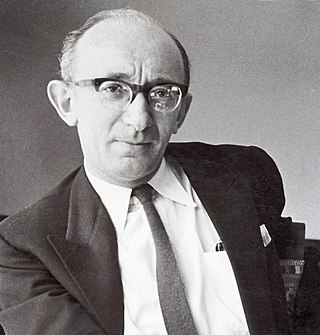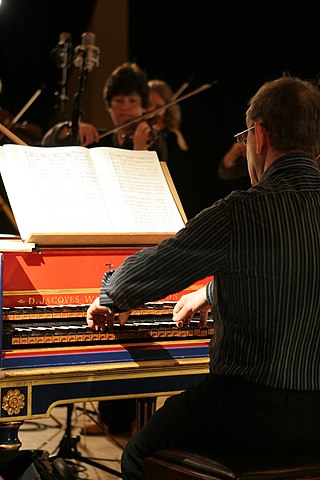Related Research Articles

Sir Clifford Michael Curzon CBE was an English classical pianist.

Trevor David Pinnock is a British harpsichordist and conductor.

François Couperin was a French Baroque composer, organist and harpsichordist. He was known as Couperin le Grand to distinguish him from other members of the musically talented Couperin family.

Christopher Jarvis Haley Hogwood was an English conductor, harpsichordist, writer, and musicologist. Founder of the early music ensemble the Academy of Ancient Music, he was an authority on historically informed performance and a leading figure in the early music revival of the late 20th century.
Louis Couperin was a French Baroque composer and performer. He was born in Chaumes-en-Brie and moved to Paris in 1650–1651 with the help of Jacques Champion de Chambonnières. Couperin worked as organist of the Church of St. Gervais in Paris and as musician at the court. He quickly became one of the most prominent Parisian musicians, establishing himself as a harpsichordist, organist, and violist, but his career was cut short by his early death at the age of thirty-five.

Davitt Moroney is a British-born and educated musicologist, harpsichordist and organist. His parents were of Irish and Italian extraction – his father was an executive with the Anglo-Dutch Unilever conglomerate. From 1968 onward, he undertook his undergraduate and graduate studies in musicology at King's College London, the faculty of which was headed by Thurston Dart, a great influence on the world of early music. Moroney later pursued advanced harpsichord studies with Kenneth Gilbert and Gustav Leonhardt. Moroney also holds performance and teaching diplomas (1974) from the Royal Academy of Music and the Royal College of Music. After earning his PhD in musicology from the University of California, Berkeley in 1980 with a thesis on the music of Thomas Tallis and William Byrd, he returned to Paris and worked mainly as a freelance performer until returning to the United States to serve on the faculty at UC Berkeley in 2001.
Jacques Duphly was a French harpsichordist and composer.

Gustav Maria Leonhardt was a Dutch keyboardist, conductor, musicologist, teacher and editor. He was a leading figure in the historically informed performance movement to perform music on period instruments.

Jean-Henri d'Anglebert was a French composer, harpsichordist and organist. He was one of the foremost keyboard composers of his day.

A harpsichordist is a person who plays the harpsichord. Harpsichordists may play as soloists, as accompanists, as chamber musicians, or as members of an orchestra, or some combination of these roles. Solo harpsichordists may play unaccompanied sonatas for harpsichord or concertos accompanied by orchestra. Accompanist harpsichordists might accompany singers or instrumentalists, either playing works written for a voice and harpsichord or an orchestral reduction of the orchestra parts. Chamber musician harpsichordists could play in small groups of instrumentalists, such as a quartet or quintet. Baroque-style orchestras and opera pit orchestras typically have a harpsichordist to play the chords in the basso continuo part.

Masaaki Suzuki is a Japanese organist, harpsichordist, conductor, and the founder and music director of the Bach Collegium Japan. With this ensemble he is recording the complete choral works of Johann Sebastian Bach for the Swedish label BIS Records, for which he is also recording Bach's concertos, orchestral suites, and solo works for harpsichord and organ. He is also an artist-in-residence at Yale University and the principal guest conductor of its Schola Cantorum, and has conducted orchestras and choruses around the world.

Richard Egarr is a British conductor and keyboard player.

Christophe Rousset is a French harpsichordist and conductor, who specializes in the performance of Baroque music on period instruments. He is also a musicologist, particularly of opera and European music of the 17th and 18th centuries and is the founder of the French music ensemble Les Talens Lyriques.
Harry Alexander Clarence Bicket is a British conductor, harpsichordist and organist. He is particularly associated with the baroque and classical repertoire.

Alan Curtis was an American harpsichordist, musicologist, and conductor of baroque opera.
Laurence Alexander Cummings is a British harpsichordist, organist, and conductor. He is currently music director of the Academy of Ancient Music.
Gary Cooper is an English conductor and classical keyboardist who specialises in the harpsichord and fortepiano. He is known as an interpreter of the keyboard music of Bach and Mozart, and as a conductor of historically informed performances of music from the Renaissance, Baroque, Classical and Romantic periods.

Martin Pearlman is an American conductor, harpsichordist, composer, and early music specialist. He founded the first permanent Baroque orchestra in North America with Boston Baroque in 1973–74. Many of its original players went on to play in or direct other ensembles in what became a growing field in the American music scene. He later founded the chorus of that ensemble and has been the music director of Boston Baroque from its inception up to the present day.

Mahan Esfahani is an Iranian-American harpsichordist.

Anthony Newman is an American classical musician. While mostly known as an organist, Newman is also a harpsichordist, pianist, composer, conductor, writer, and teacher. He is a specialist in music of the Baroque period, particularly the works of Johann Sebastian Bach, and has collaborated with such noted musicians as Kathleen Battle, Julius Baker, Itzhak Perlman, Eugenia Zukerman, Jean-Pierre Rampal, Leonard Bernstein, Michala Petri, and Wynton Marsalis, for whom he arranged and conducted In Gabriel’s Garden, the most popular classical record of 1996.
References
- ↑ The 1968 Proms. "Prom 49", BBC, London. Archive from 11 September 1968.
- ↑ Diana: Making news again Thirsk Weekly News. Archived 5 September 2012 at the Wayback Machine
- ↑ Higham Hall. "Origins and analysis of choral masterpieces, residential course" Archived 25 January 2013 at archive.today .
- ↑ Classical Archives. "the charm and bravura supplied in these performances suggest the characterizations Couperin intended", François Couperin: Pièces de Clavecin.
- ↑ The Creel. "The Journal of the Friends of Alan Rawsthorne", the Rawsthorne Trust.
- ↑ Classic Music on the Web. "Handel Organ Music, by Alan Cuckston", Foxglove Audio.